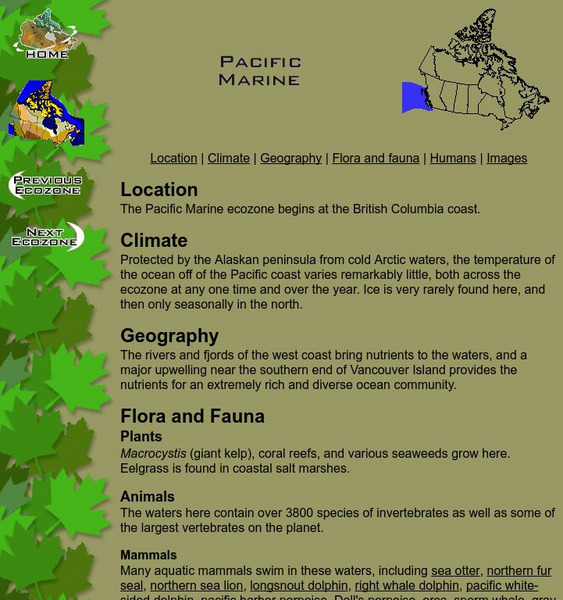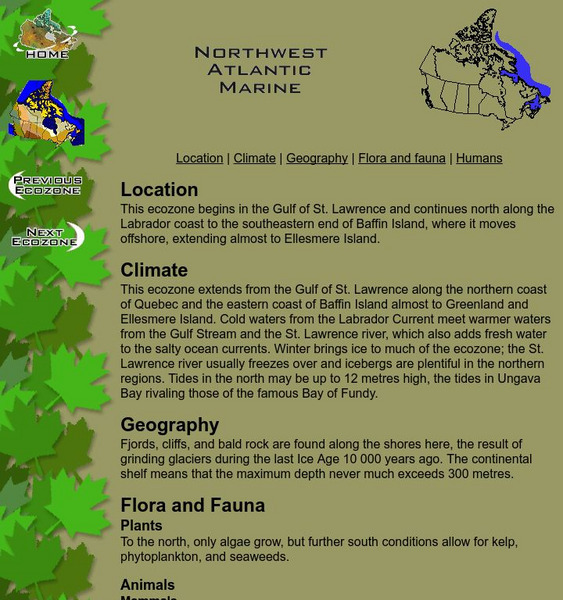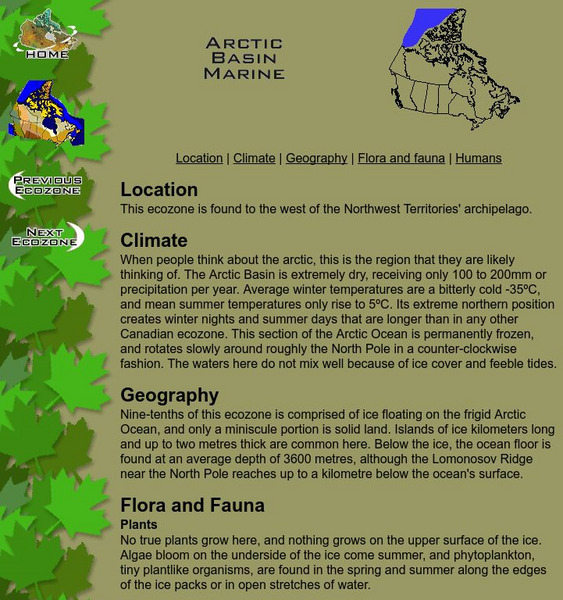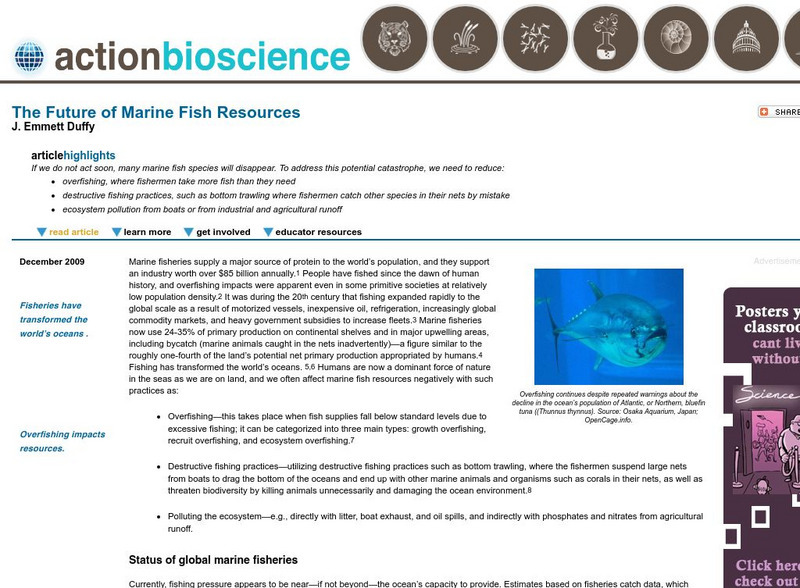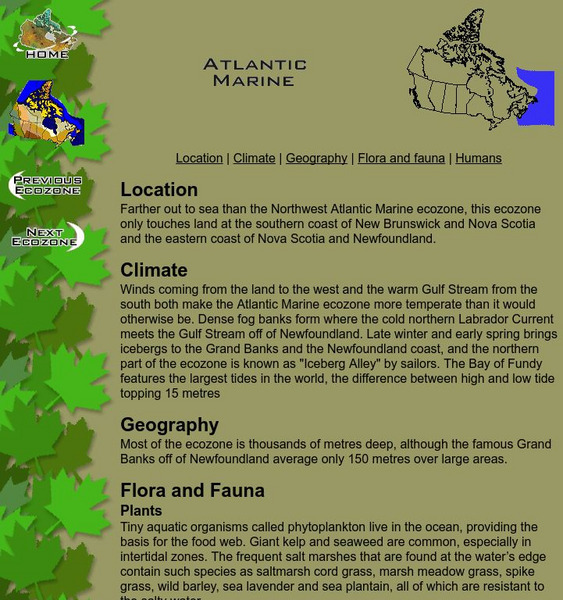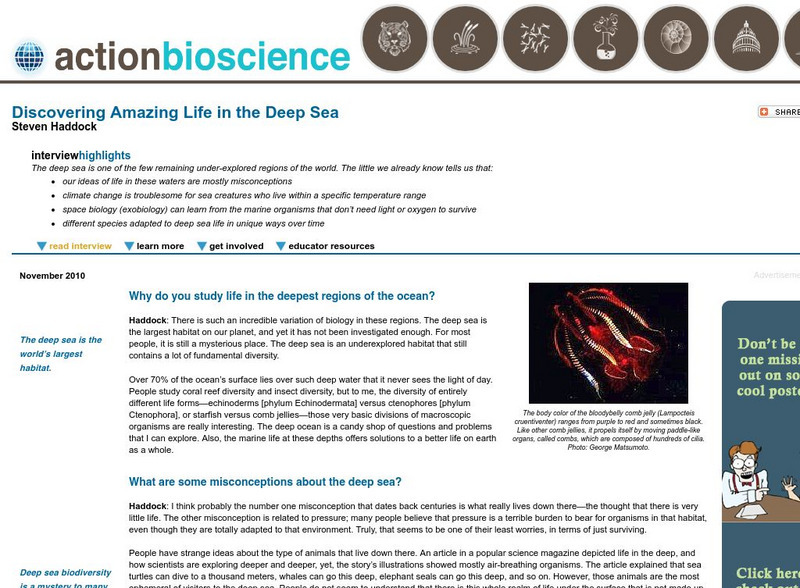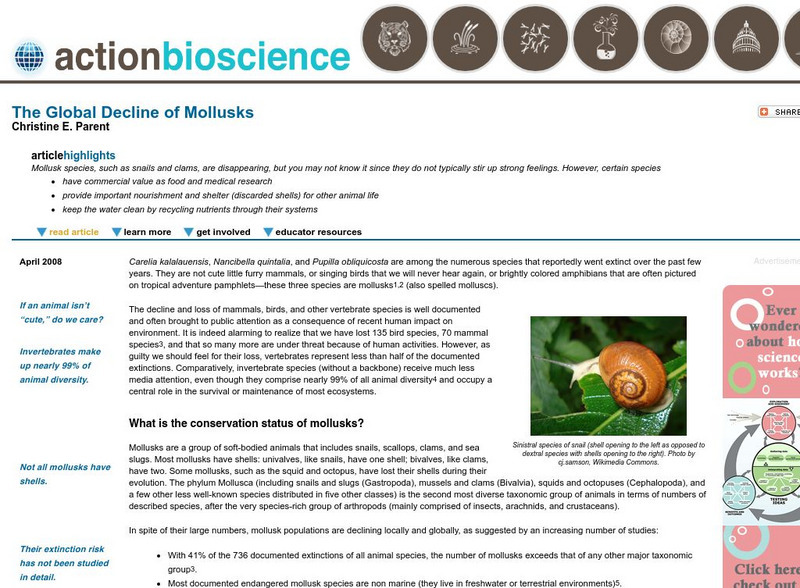Hi, what do you want to do?
National Geographic
National Geographic: Marine Ecosystems and Biodiversity
In this unit students explore major marine ecosystems by locating them on maps. Students use marine examples to learn about energy transfer through food chains and food webs and then they discuss how food webs can illustrate the health...
National Geographic
National Geographic: Marine Ecosystems and Biodiversity
A collection of three lessons where students learn about abiotic factors in marine ecosystems, about marine food chains and biodiversity, and about marine food webs and trophic levels. Includes handouts, website links, and a vocabulary...
McGill University
Mc Gill University: Canadian Biodiversity: Ecozones: Pacific Marine
The Pacific Marine ecozone begins at the British Columbia Coast. This is a brief, concise description of the location, climate, geology and flora and fauna. It includes some images of the animals and birds native to the location. Many of...
McGill University
Mc Gill University: Canadian Biodiversity: Ecozones: Northwest Atlantic Marine
The Northwest Atlantic Marine ecozone begins in the Gulf of St. Lawrence and extends to the southeastern end of Baffin Island. This is a brief, concise description of the location, climate, geology, and flora and fauna. It includes some...
McGill University
Mc Gill University: Canadian Biodiversity: Ecozones: Arctic Basin Marine
The Arctic Basin Marine ecozone is found to the west of the Northwest Territories archipelago. This brief, concise description includes a collection of images of the animals and birds native to the location. Many of the images include...
McGill University
Mc Gill University: Canadian Biodiversity: Ecozones: Arctic Archipelago Marine
The Arctic Archipelago Marine ecozone includes Hudson Bay and most of the water surrounding the islands of Nunavut and the Northwest Territories. This is a brief, concise description of the location, climate, geology, and flora and...
American Institute of Biological Sciences
Action Bioscience: The Future of Marine Fish Resources
An article and supporting resources address the potential of fish populations significantly decreasing with overfishing, careless fishing, and pollution from nautical vessels and runoffs.
American Museum of Natural History
American Museum of Natural History: It Takes All Kinds to Make a World
Learn about the biodiversity found in the ocean by looking at examples of marine life.
McGill University
Mc Gill University: Canadian Biodiversity: Ecozones: Atlantic Marine
The Atlantic Marine ecozone is located father out to sea and touches land at the southern coast of New Brunswick and Nova Scotia and the eastern coast of Nova Scotia and Newfoundland. This brief, concise description includes a collection...
American Institute of Biological Sciences
Action Bioscience: Discovering Amazing Life in the Deep Sea
A research biologist at the Monterey Aquarium and a professor at UC-Santa Cruz is interviewed to explain the studies done in the deep sea. Steven Haddock addresses the purpose of uncovering the mysteries of life and environment lying out...
American Institute of Biological Sciences
Action Bioscience: Environmental Impacts of Marine Exotics
Invasive species are disrupting many bodies of water in North America. Scientists share their reasons for concern in this brief article. Supporting and educator resources are provided.
American Institute of Biological Sciences
Action Bioscience: The Decline of North American Freshwater Fishes
An article addressing the need of immediate action to repair damages of declining life in the ecosystems of North American inland bodies of water.
Other
Australian Government: Dept. Of Agriculture: Environment
Improving stewardship and sustainable management of Australia's environment including topics such as biodiversity, EPBC Act, Marine, Protection, International Activities, and Partnership.
California Academy of Sciences
California Academy of Sciences: 2011 Philippine Biodiversity Expedition
The 2011 Philippine Biodiversity Expedition is the largest expedition undertaken by the Academy. It will be the first expedition to make a comprehensive survey of both terrestrial and marine diversity.
American Institute of Biological Sciences
Action Bioscience: The Global Decline of Mollusks
You can help! Species of mollusks are disappearing from our marine sources. While it might not be obvious to the casual beach-goer, these shelled creatures provide food and shelter, medical research, and help keep our waters clean.
PBS
Pbs: Nature: The Fascinating World of Jellies
Learn about the mysterious jellyfish blooms that have occurred in the world's oceans. Because the resulting alteration to the marine food web has had devastating effects, researchers grow and study jellyfish at the Monterey aquarium....
NOAA
Noaa: Ocean Diversity Challenge [Pdf]
Read descriptions of organisms that live in the ocean. Locate the organisms on a poster based on their description.
University of California
Ucmp: The World's Biomes
The University of California Museum of Paleontology hosts this site devoted to the study of the earth's biomes, which are the world's major communities, classified according to the predominant vegetation and adaptations of organisms to...
Center for Educational Technologies
Nasa Classroom of the Future: Coral Reefs: Dissappearing Resource
Why are the reefs disappearing? Use this site to explore the science behind the issue. Useful at several grade levels.
California Academy of Sciences
California Academy of Sciences: Science in Action: Philippine Biodiversity Expedition
The Academy's expedition to the Philippines discovered unusual treasures at great depths.
Nature Conservancy
Nature Conservancy: Planet Earth: Oceans and Coasts
Compilation of the Nature Conservancy's content about the ecology of oceans and coasts. Emphasis is on the biodiversity of these habitats and the human impact on the animal and plant life that live in our oceans and on our coasts.
Curated OER
Unesco: Spain: Ibiza, Biodiversity and Culture
Ibiza provides an excellent example of the interaction between the marine and coastal ecosystems. The dense prairies of oceanic Posidonia (seagrass), an important endemic species found only in the Mediterranean basin, contain and support...
TED Talks
Ted: Ted Ed: The Otherworldly Creatures in the Ocean's Deepest Depths
Although the deep ocean zone seems like an inhospitable and remote corner of the planet, it is actually one of the greatest habitats on Earth. Lidia Lins explores how so many species thrive in this mysterious underwater world. [5:02]
PBS
Garden of Eden: Seychelles
This interactive site on Seychelles discusses species diversity and much more! Learn all about how an island forms, how supercontinents divide, and why this atoll boasts both giant and miniature forms of species.







